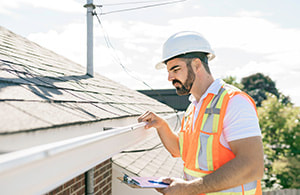 Buying a home is a big investment that is accompanied by risk. Minimizing that risk is as simple as arranging for an inspection of the home to ensure that everything is working properly. A thorough inspection of these areas is important before buying or selling a home. Electrical inspections are very important. Making sure a home’s electrical system is safe can’t be overstressed. This task involves looking at the circuit breakers, house wiring, and outlets. If anything does not meet existing electrical codes, repairs will be needed. Heating and cooling are an integral part of keeping your home’s temperature regulated and comfortable. The entire system is evaluated, including the heater, AC unit, chimney, duct system, and fireplace (if there is one). Roof inspections identify existing structural damage caused by a leaky roof and provide information about necessary roof repairs or even a roof replacement. Such an inspection typically includes a look at the flashing, downspouts, and gutters to ensure everything is in good condition. Plumbing inspections assess the integrity of the water lines, sewage lines, faucets, toilets, sinks, tubs, showers, and water heater. This inspection identifies leaks, misalignments, and other issues that should be corrected and verifies that the plumbing meets local and state codes and ordinances. Air quality is important for your health. Toxic substances present within a home will affect the air quality. Some toxic substances to screen for include radon, asbestos, mold, mildew, lead, and fungus. Many of these substances can aggravate existing health issues or even cause new health problems. Pest infestations, particularly large ones, can cause structural damage. Before buying a home, you should hire a specialist to check for pests such as termites, carpenter ants, carpenter bees, mice, squirrels, bats, and raccoons. Your real estate agent can help you find a qualified home inspector. Since states have rules about the parts of a house that must be inspected prior to sale, you may need to specifically request additional inspections for items not included on this list.
0 Comments
 Selling your home and moving on to bigger and better things can be exciting, especially in a seller’s market. However, some unexpected stress might come along with the home-selling process. Here are four ways selling your home may be more disruptive than you thought—and how to get through the process in one piece. 1. Taking the “Home” out of Your House Your real estate agent will give you advice, and potential buyers will have their own personal tastes and criticisms, but try not to take all of it too hard. Even overhearing what potential buyers might want to change in your home can set off an emotional response. If you have made some personal decor choices over the years that your real estate agent suggests undoing, such as taking down artwork or painting over bold-colored walls, remember that this advice is just to help you reach a larger potential-buyer audience. 2. Being Available at All Times While your real estate agent will do most of the heavy lifting when it comes to selling your home, there will be things you’ll need to be available for. Potential homeowners may want to view your home at unscheduled times. Once an offer is accepted, buyers might want to schedule additional inspections or have questions about who will be covering what in the closing costs. Remember, as owner of your home, you will need to be available for selling-related issues. 3. Working Through Negotiations Unexpected issues might come up when closing on your home, from additional inspections to new damages found that weren’t in initial disclosures. Your buyers may come back asking to work with you to split repair costs or negotiate fixing problems before move-in. Try your best not to let curve balls get to you. They are normal and aren’t things that will necessarily undo the closing process on your home. 4. A Quick Move-Out Buyers may be quick to close on a home due to their own living situation or parameters of preapproved mortgages. Mentally and logistically preparing yourself for the possibility of moving quickly is a good idea. If closing happens swiftly, you might even be able to put together a deal with the homebuyers, such as negotiating more time to move out or even “renting” your home for a period of time after closing to buy some time to pack up and move. Having a solid real estate agent in your corner really helps relieve stress. They do the behind-the-scenes work so you don’t have to deal with every detail. If you’re thinking about selling or have questions, contact me today! |
AuthorBe informed with the latest real estate news and useful real estate related information. Archives
March 2025
Categories
|
